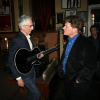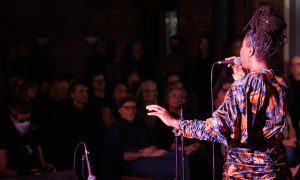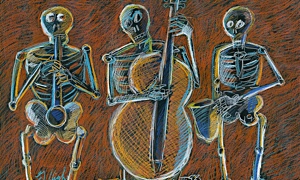Home » Jazz Articles » What is Jazz? » Jazz and Philosophy
Jazz and Philosophy
Like philosophy, jazz summons us to attend carefully to itself.
—The great philosophers lived and died without swinging (as far as we know). Socrates, Plato, Aristotle, and Augustine, may have written about music, but not jazz music. That would have to wait for centuries. Jazz had a centuries long gestation.
Philosophy is the discipline of finding meaning and truth through reasoning. It aspires to find the essence in the messes of things and to thrust that essence in our face saying, "So what?"—as did Miles Davis on Kind of Blue. "What is justice?" asked Socrates, when everyone knew—but no one really knew—the answer. "What is jazz?" is much the same: we all know, but do we know? The great philosophers lived and died without swinging (as far as we know). Socrates, Plato, Aristotle, and Augustine, may have written about music, but not jazz music. That would have to wait for centuries. Jazz had a centuries long gestation.
Like many things, we may come to jazz without articulated intellectual questions. We are not usually in the classroom, but at the club, or auditorium, or sitting in front of our sound system. We listen and are moved. Or not. That is, we feel an immediate response, whatever that may be. Pat Metheny's response was love at first listen. He did not have to work his way into jazz. It found him. In my late teens, I was drawn to jazz-rock fusion, but still only picked up the crumbs from the dinner plates of jazz. It boggles my mind to think that I had a vinyl album of A Love Supreme, in my senior year of high school—along with my Deep Purple, Yes, and Jimi Hendrix. But I seldom played it. It was beyond me at the time, but not beneath me. It had to wait for me to catch up—and I did.
Since then this philosopher has come to savor this music, a distinctively American art form (but not limited to America). But what is philosophical about jazz? Yes, some jazz men are philosophical: John Coltrane supremely so. But that is not all I mean.
Like philosophy, jazz summons us to attend carefully to itself. Just as you shouldn't read philosophy in a hurry, you shouldn't listen to jazz casually—that is, if you want to find the center and get immersed in the vibe. It draws you in and keeps you there. Is the singer a little behind the beat? Did Charlie Haden play the same note through several choruses on the recording, Last Dance with Keith Jarrett? It seemed odd, but fit perfectly. Of course it did. It was Charlie Haden.
Further, Aristotle wrote that "Philosophy begins in wonder." I wonder over and ponder the relation of the mind and the body, the relation of God to the world, the relation of unity and diversity (to be more abstract). When I introducedPat Martino at Dazzle recently, I quoted Aristotle and added, "Many of us wonder how Pat can play like that." Pat tells me that his playing is "pure emotion" and comes from a higher source. On the same note, many of us wonder over the emotion and aspirations flaming out of John Coltrane's music—particularly A Love Supreme. Music comes from musicians and their instruments. But is that all there is to it? Does the structure of music exist apart from its performance? Eric Dolphy was recorded as saying that the music flies off into space and is no more. Was he right, or is that music retained in some sacred vault beyond our memories or recordings?
Like any philosopher, I could go on, but this is an essay (a short solo), not a book. Perhaps that book needs to be written. However, I will go on listening philosophically to this philosophical music: jazz. Please join me in this performance.
Tags
PREVIOUS / NEXT
Support All About Jazz
 All About Jazz has been a pillar of jazz since 1995, championing it as an art form and, more importantly, supporting the musicians who make it. Our enduring commitment has made "AAJ" one of the most culturally important websites of its kind, read by hundreds of thousands of fans, musicians and industry figures every month.
All About Jazz has been a pillar of jazz since 1995, championing it as an art form and, more importantly, supporting the musicians who make it. Our enduring commitment has made "AAJ" one of the most culturally important websites of its kind, read by hundreds of thousands of fans, musicians and industry figures every month.
























